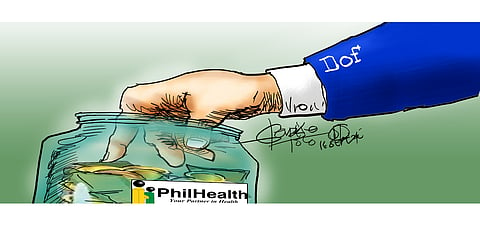
- NEWS
- the EDIT
- COMMENTARY
- BUSINESS
- LIFE
- SHOW
- ACTION
- GLOBAL GOALS
- SNAPS
- DYARYO TIRADA
- MORE

Finance Secretary Ralph Recto has a lot of explaining to do regarding a directive that seeks to cover more than P200 billion in pork barrel in the 2024 General Appropriations Act (GAA).
Last March, the Department of Finance (DoF) issued Circular 003-2024, which directed government-owned and controlled corporations (GOCCs) to remit excess funds back to the Treasury to allow the government to fund unprogrammed appropriations.
The DoF then proceeded to recover P89.9 billion from the Philippine Health Insurance Corp. (PhilHealth) and P110 billion from the Philippine Deposit Insurance Corp. (PDIC) in “excess funds” to finance unprogrammed appropriations in the budget.
Insertions in the 2024 budget, mostly pet projects of members of Congress, dislodged items that were relegated to a portion requiring the government to search for financing.
“These ‘crucial government projects’ were placed by members of the congressional bicameral conference committee under the unprogrammed appropriations of the 2024 budget. Unprogrammed appropriations imply that these projects are not a priority and can only be funded if there is surplus revenue,” said University of the Philippines School of Economics professor Cielo Magno.
Magno and budget watchdog groups have petitioned the Supreme Court to invalidate the DoF directive.
Recto, during the deliberation of the 2024 budget, was a congressman and a member of the bicameral conference committee, giving him full knowledge of what transpired in the switching of budget items.
The bicam also made notable increases in the budgets of the House of Representatives (P12 billion), Senate (P2 billion) and the Department of Public Works and Highways (DPWH, P173.89 billion).
Magno noted that the increase in the DPWH budget is primarily for flood control and convergence programs, which include roads and multipurpose buildings.
She asked: “Is it sound financial management to further increase the budget of the DPWH when its disbursement rate for flood control projects is only at 58 percent, as was revealed in a Senate hearing?”
Flood control projects, community road projects, and multipurpose halls are favorite sources of kickbacks.
“The bicameral conference committee deliberation is the most opaque of all legislative processes in the country. No livestream, no publicly available minutes, no accountability,” Magno said.
Magno referred to public finance management, which requires the allocation of funds for priority development projects.
“These projects should not have been set aside to make way for pork barrel insertions,” she added.
“How can we call prioritizing pork barrel spending and discretionary projects over vital social programs responsible public financing?”
PhilHealth and PDIC are insurance corporations, meaning their funds should be used for specific purposes.
Predecessors of Recto at the DoF recently expressed support for siphoning excess funds.
The position paper focused on the difficulty of mobilizing revenue to finance crucial government projects and the opportunity costs of leaving funds dormant.
“However, we must consider the critical matters that they have missed, if we are to evaluate from a responsible public finance perspective the action taken by Secretary Recto,” Magno said.
Recto must account for removing funds from PhilHealth, which passes the burden of financing social health insurance programs mainly to salaried employees, who, as direct contributors, are required to pay PhilHealth premiums.
The oral arguments called by the Supreme Court on the DoF directive will be interesting, as they will expose Recto’s hand in the pork barrel insertions and subsequent cover-up in the 2024 budget.
